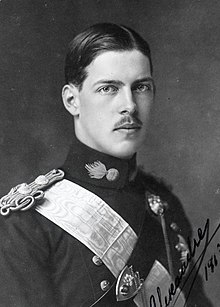Constantine XIX Anicius
This article is incomplete because it is pending further input from participants, or it is a work-in-progress by one author. Please comment on this article's talk page to share your input, comments and questions. Note: To contribute to this article, you may need to seek help from the author(s) of this page. |
| Constantine XIX | |||||
|---|---|---|---|---|---|
 | |||||
| Latin Emperor Perateian Emperor | |||||
| Reign | 15 April 1934 – 12 April 1945 | ||||
| Coronation | 25 December 1934 | ||||
| Predecessor | John XIV Anicius | ||||
| Successor | Diana I Anicia | ||||
| Co-emperor | John XIV Anicius (until 1937) | ||||
| Born | 8 September 1907 Questros Palace, Thessalona, Salonika, Belfras | ||||
| Died | 12 April 1945 (aged 37) Palatium Purpura, Ascanium | ||||
| Burial | 4 July 1948 Imperial Crypt, Castellum ab Alba | ||||
| Spouse | Christina of Rahdenburg (m. 1928) | ||||
| Issue Detail |
| ||||
| |||||
| House | Anicia | ||||
| Father | John XIV Anicius | ||||
| Mother | Alexandra of Ghant | ||||
| Religion | Imperial Church (Catholicism) | ||||
Constantine XIX Anicius (Gaius Anicius Constantinus Theophylactus Valentinius Honorius Caesar; 8 September 1907 – 12 April 1945) was Latin Emperor from 1934 until 1945, and was under the regency of his father until 1928. He was the second Latin monarch to be born outside of Belsiaria since the 17th century, and the first to be born on Norumbia.
At the time of his birth, Constantine was the first joint heir of Latium and Perateia, for which he was named Prince of Youth and Despot of Levedos with the additional title of Protosebastokrator. Constantine was primarily raised in Leonople, and was fluent in both Latin and Perateian. Court biographers wrote that Constantine deeply favored the Perateian Ecumenical faith, but he remained a Fabrian Catholic and enjoyed warmed relations with both Pope Florentine II and his successor Pontian X, as well as Ecumenical Patriarch Theodosios IV.
While able to restore stability initially after his father's untimely death, the latter half of his reign was plagued with political instability and flaring tensions between the imperial goverment, Gelonian partisans, and growing socialist sentiments. No senate majority survived for more than two years until 1945. He was murdered in the Ascanium Massacre, which sparked the Social War, and ended with his eldest child and daughter Diana installed as Empress. His remains were never recovered following the Imperial recapture of Alexandria, however a tomb was installed at Sancta Sapientia, in Castellum for him and his wife.